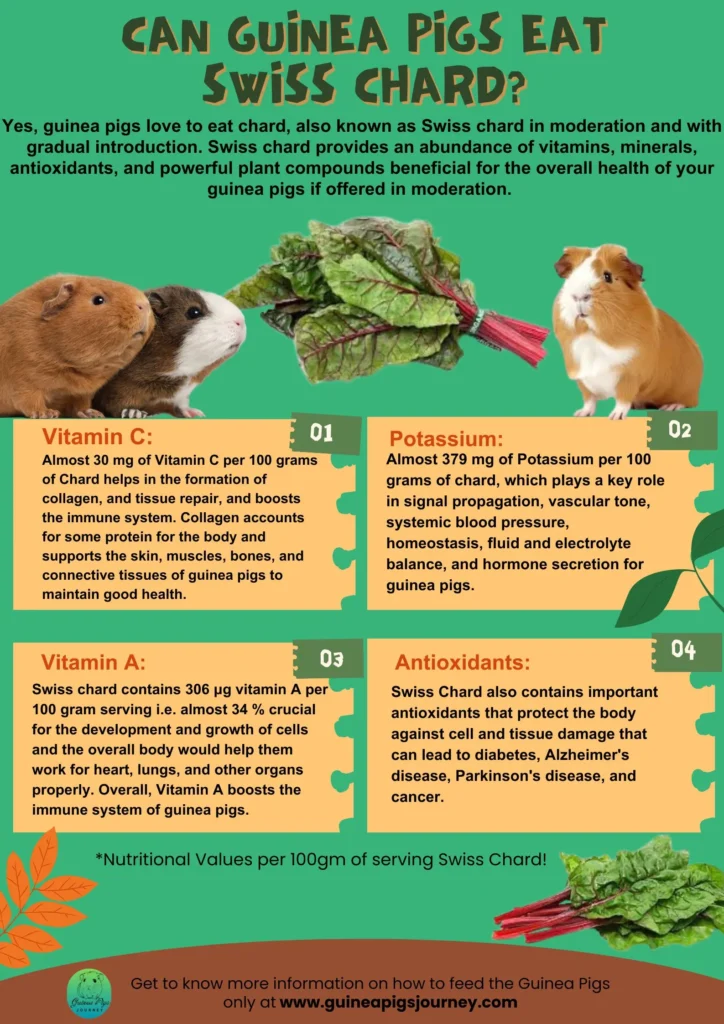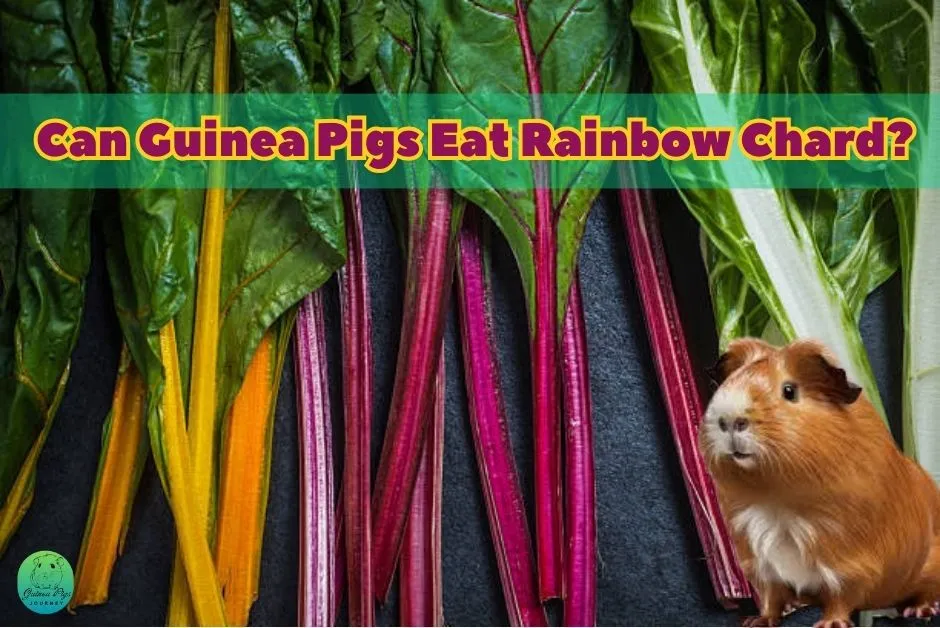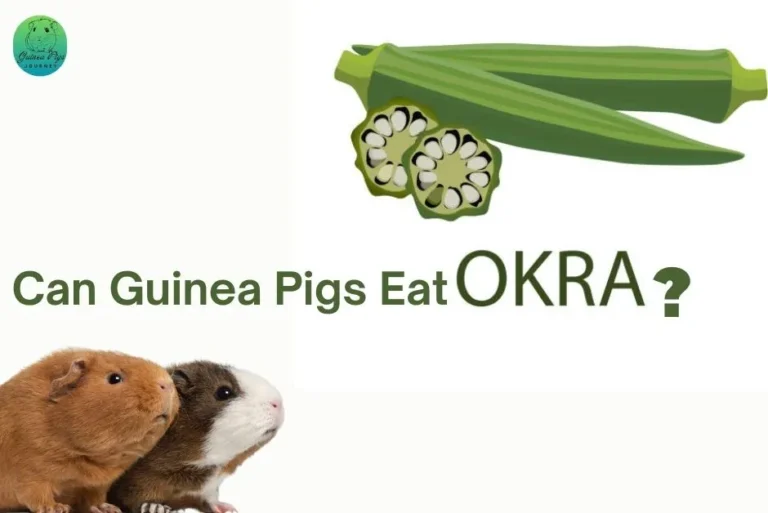Chard! Also known as Swiss chard, it is a leafy green belonging to the Chenopodioideae family, which also includes beets and spinach. Its common names include silver beet, beet spinach, seakale beet, or leaf beet. This dark, leafy green vegetable just like kale, arugula, lettuce, cilantro, rosemary, or mustard greens is equally impressive for its wide spray of nutritional benefits for humans as well as cute pets. Though, you must be wondering a question if you have little furry friends, can guinea pigs eat Swiss chard?
Yes, guinea pigs love to eat chard, also known as Swiss chard in moderation and with gradual introduction. Swiss chard provides an abundance of vitamins, minerals, antioxidants, and powerful plant compounds beneficial for the overall health of your guinea pigs if offered in moderation. Excessive feeding of Swiss chard can be harmful due to the high oxalate content which can cause kidney stones and renal failure if consumed in large quantities that can be very painful for your guinea pigs. There are also some other factors you must consider before deciding to offer Swiss chard in the guinea pigs’ diet.
This long guinea pig journey and experience have taught me to do proper research before offering any new food to my guinea pigs, so I decided to share this valuable knowledge and research with my fellow guinea parents about Swiss chard for guinea pigs. Let’s quickly go through the risks and drawbacks of Swiss chard for guinea pigs as well as nutritional benefits, serving, and more about Swiss chard for guinea pigs.
Nutritional Requirements of Guinea Pigs:
The recommended and best diet for your guinea pigs is very crucial for their overall growth, development, and good health. This is only achieved through the proper care, love, attachment, and the best way of feeding and serving your guinea pigs.
So, always do proper research before deciding to offer any new food to your guinea pigs because not all the foods you would offer or your guinea pigs’ nibbles are safe like pickles, meat, dairy products, etc. Some foods are toxic and some have no nutritional values and benefits for your guinea pigs, other foods can cause digestive issues and serious health complications. So, always read about those foods not recommended to feed your guinea pigs for the safe and healthy life of your guinea pigs.
In general, Guinea pigs require good and fresh quality hay which makes up 80-90 % of most of their diet along with 10 % of fresh and good quality fruits and vegetables such as sugar snap peas, broccoli, asparagus, dandelions, mushrooms, butternut squash, jicama, pears, dragon fruit, pomegranate, cherries, plums, etc. as a treat in moderation.
Guinea pigs can also be served with some amount of only dedicated guinea pig pallets but it should not be part of their main staple and should be served the recommended portion or mentioned on pallets bag for guinea pigs. Guinea pigs should also be served with fresh, clean, chlorine-free drinking water at all times and must be checked and changed twice a day for their good health.
Swiss chard for guinea pigs has many beneficial nutrients and covers a wide array of minerals and vitamins like a good source and packs a hearty dose of vitamin A, vitamin C, vitamin K, vitamin E, iron, copper, potassium, and magnesium. This dark leafy green veggie is not only loaded with nutrients but also extremely low in calories. Hence, it’s a great option to help your guinea pigs maintain a moderate weight if offered in moderation.

It is pertinent to mention that before deciding to introduce any new food like chard or Swiss chard for guinea pigs you must know the nutritional analysis of all parts of Swiss chard for guinea pigs so that an owner can decide on the quantity and portion of serving as well as the values and percentage of nutrients available with Swiss chard for guinea pigs to ensure moderation.
Nutritional Analysis Of Swiss Chard For Guinea Pigs:
Swiss chard for guinea pigs is low in calories and high in magnesium, iron, potassium, and vitamins A, C, and K. However, it is one of the vegetables high in oxalate and calcium as well, so understanding the values and percentage of nutrients, minerals, and vitamins present in Swiss chard for guinea pigs is very important. According to the USDA Food Database, listed below are the nutritional values and percentages per 100 grams of raw Swiss chard for guinea pigs to understand the values and percentages of these important nutrients chard contains for guinea pigs and how much is required for your lovely pets for optimum health benefits.

| Nutrients | Value per 100 grams | Daily Value / 100 gm. (DV %) |
| Calories | 19 kcal | |
| Carbohydrates | 3.74 grams | 1 % |
| Water | 92.7 grams | |
| Fat | 0.2 gram | 0 % |
| Protein | 1.8 gram | 4 % |
| Dietary Fiber | 1.6 grams | 6 % |
| Sugar | 1.1 grams | |
| Net Carbs | 2.14 grams | |
| Ash | 1.6 grams | |
| Vitamin C, total ascorbic acid | 30 mg | 33 % |
| Vitamin A, RAE | 306 µg | 34 % |
| Vitamin K | 830 µg | 692 % |
| Vitamin E | 1.89 mg | 13 % |
| Vitamin B-6 | 0.099 mg | 6 % |
| Vitamin D | 0 mcg | 0 % |
| Cholesterol | 0.00 mg | 0 % |
| Fatty Acid (Saturated) | 0.03 g | 0 % |
| Folate | 14 µg | 4 % |
| Calcium, Ca | 51 mg | 4 % |
| Phosphorus, P | 46 mg | 4 % |
| Potassium, K | 379 mg | 8 % |
| Iron, Fe | 1.8 mg | 10 % |
| Magnesium, Mg | 81 mg | 19 % |
| Zinc, Zn | 0.36 mg | 3 % |
| Sodium, Na | 213 mg | 9 % |
| Copper, Cu | 0.179 mg | 20 % |
| Lutein + zeaxanthin | 11000 µg | |
| Beta-carotene | 3647 µg |
Note: * The % Daily Value (DV) indicates how much a nutrient in a serving of food subsidizes a daily diet.
Is Swiss Chard Good For Guinea Pigs?
After analyzing the nutritional values and percentage of Swiss chard for guinea pigs, it is low in fat and calories and high in important nutrients like iron, magnesium, potassium, folate, antioxidants, and vitamins A, C, and, K. So, it is analyzed that chard is good for guinea pigs in moderate quantity as it also contains a good amount of sodium, phosphorus, oxalate, and calcium which can cause serious health-related issues which I will discuss in subsequent paragraphs. So moderation and gradual introduction are very necessary whereas an excessive amount can lead to several health issues. So, let’s quickly go through what are the nutritional benefits of Swiss chard for guinea pigs.

Vitamin C:
Swiss chard for guinea pigs contains 30 mg per 100 gm. serving i.e. almost 33 % and 1 large leaf provides almost 14.4 mg. Vitamin C is beneficial for the overall growth, development, and immune system of guinea pigs as they cannot produce their own. Vitamin C also protects the guinea pigs from a dangerous disease called scurvy which can even lead to malnutrition. Guinea pigs require 20-30 mg of vitamin C per day to keep themselves healthy and their immune system strong. So Swiss chard can contribute to a fair amount of vitamin C if mixed with other vegetables high in Vitamin C.
Vitamin A:
Swiss chard for guinea pigs contains 306 µg vitamin A per 100 gram serving i.e. almost 34 % crucial for the development and growth of cells and the overall body would help them in working of heart, lungs, and other organs properly. Overall, Vitamin A boosts the immune system of guinea pigs. Vitamin A helps to regenerate skin cells and tissues that help fight against any type of infection including fungal infection which is very common in guinea pigs.
Vitamin K:
Swiss chard for guinea pigs contains 830 µg i.e. almost 692 % per 100 gram serving beneficial for cellular functions and blood clotting at the time of any injury that might occur in your guinea pigs. Consuming Vitamin K properly may heal those injuries as early as possible. Vitamin K also supports heart health by preventing the hardening of arteries including calcium out of the artery linings. It is also essential for bone health and low vitamin K intake is associated with an increased risk of osteoporosis and fractures in guinea pigs.
Potassium:
Swiss chard for guinea pigs is a good source of potassium and contains almost 379 mg per 100 grams. It is beneficial for maintaining healthy blood pressure levels, proper functioning of muscles and nervous system, and regulating the fluid in the body to keep the heart functioning properly whatever stage guinea pigs are. Potassium also helps to create proteins and carbohydrates in humans as well as in guinea pigs and regulates the heartbeat and oxygen support for guinea pigs.
What Are The Risks Of Swiss Chard For Guinea Pigs?

Formation of Kidney Stones and Renal Failure:
Swiss chard for guinea pigs is one of the vegetables found with high amounts of oxalate containing up to 700mg per 100 grams, which in excessive feeding can lead to the formation of kidney stones and subsequently renal failure due to the binding of minerals in the body of guinea pigs which can lead to painful and serious health-related issues for guinea pigs. Some studies suggest that guinea pigs should not be served more than 50 mg of oxalic acid per day to avoid risks.
High Calcium Content:
Swiss chard for guinea pigs also contains a high amount of calcium content i.e. almost 51 mg per 100 gram serving which can be harmful for guinea pigs in excess which can lead to the formation of stones. These stones are mostly formed due to calcium binding with oxalate acid in their bodies and chard have both oxalate and calcium in high amounts.
Urinary Tract Issues:
The high content of calcium in Swiss chard for guinea pigs can also be harmful to their urinary tract if fed excessively which can cause urinary tract complications leading to the formation of urinary stones, pain in the urinary tract, bleeding in the urine of guinea pigs, or renal infection in the urinary tract. As with growing age, the need for calcium in your guinea pigs diet is decreased whereas young guinea pigs require it for the formation of bones. So, ensure moderation while serving Swiss chard for guinea pigs.
Allergic Reactions:
Though uncommon, Swiss chard has been reported to cause some allergic reactions, and symptoms of reaction experienced are hives, itching, or swelling after eating Swiss chard in some individual guinea pigs. So, always monitor your guinea pigs after introducing any new food including chard for guinea pigs, and make sure that you have limited the size and portion of serving at the start of any new food. If you see any kind of allergic reaction consult your vet immediately to check the guinea pigs. And stop introducing that food till the time guinea pig is good to go with.
Diarrhea:
Guinea pigs can also be prone to diarrhea due to their sensitive digestive system. So, excessive feeding of chard can be harmful and causes stomach upset, diarrhea, and bloating for guinea pigs.
Pesticides and Chemicals:
Swiss chard for guinea pigs can have some pesticides unwanted chemicals, and fertilizers sprayed during harvesting and in stores. It is recommended to thoroughly wash the chards before feeding. It is also recommended that buy organically produced chards from any verified dealer or store having a non-GMO label or grow it in your garden to ensure a safe product for your guinea pigs.
How Often Can Guinea Pigs Eat Swiss Chards? (Frequency and Size of Serving Chards)

Guinea pigs love to nibble on leafy greens and Swiss chard is one of them but excessive consumption can lead to several health issues as explained earlier. So recommended frequency and serving size for each guinea pig are very crucial.
The recommended frequency of serving Swiss chard for guinea pigs is no more than 2-3 times a week at max to ensure moderation and limit the serving to avoid overconsumption of calcium and oxalate content in their diet. You can serve chard by mixing it with other suitable vegetables low in calcium and oxalic acid as a salad as there is no harm in sharing a little mixed with other safe vegetables to achieve optimum nutritional benefits and add variety to their diet, but moderation is the key to serving.
How Much Swiss Chard Can Guinea Pigs Have?
If you want to spice up the guinea pigs’ diet plan with nutrient-dense food like chard, offer them in moderation like no more than 1-2 small leaves of chard per guinea pig, and introduce it gradually in the guinea pigs’ diet.
You can also serve them ½ amount in the morning and the other half in the evening so that they can digest it easily and adjust it into their diet.
Can Guinea Pigs Eat Swiss Chard Every Day?
No, guinea pigs should not be fed with Swiss chard every day as it contains high amounts of calcium and oxalate which cause stones, urinary tract issues, and renal failure. It is also high in sodium and phosphorus which can also be harmful if fed every day. Always offer the chard in the recommended quantity and limit the frequency by ensuring moderation to avoid any kind of risk factor for your cute little furry friends.

Can Guinea Pigs Eat Chard Salad?
Yes, you can feed chard salad by mixing it with other high-in vitamin C and low in calcium and oxalate, fresh and suitable veggies like lettuce, arugula, mustard greens, green beans, asparagus, cilantro, basil, zucchini, wheatgrass, etc. to add variety and nutritional boost as an occasional treat to ensure moderation and gradual introduction. It can only be served as a treat and should not be added to their regular or daily meal.
How to Prepare Swiss Chard for Guinea Pigs?

- Purchase/choose good quality and fresh, healthy, crisp, and firm leaves of Chard for guinea pigs and most importantly organically produced from a verified dealer or store. Avoid Chard plants with mushy brown spots, and overly wilted or limp leaves.
- Thoroughly wash the leaves in cold running water to remove any dust particles, chemicals, pesticides, or traces of germs, and let them dry after washing before serving.
- Chop chard into small pieces as a treat, however guinea pigs can eat the leaves without chopping or cutting.
- It is very important after preparing a chard, to introduce it in appropriate quantity to ensure moderation and if it is their first time then introduce a small portion i.e. one leaf for each guinea pig, and observe their reaction to adopting this new diet.
In the end, the most important task to do is when your guinea pigs are done eating Swiss chard, be sure to check and remove the uneaten parts from the cage or their surroundings to avoid the multiplication of bacteria and inviting flies that can be harmful to guinea pigs.
Can Guinea Pigs Eat Swiss Chard Leaves?
Yes, Swiss chard leaves are the main part of the plant to be fed to your guinea pigs in moderation offering numerous health benefits like decreasing the risk of obesity, diabetes, heart disease, and overall mortality, increased energy, and overall lower weight. Make sure to prepare it properly as stated above to enjoy this occasional treat.
Can Guinea Pigs Eat Swiss Chard Stems?
Yes, Stems of Swiss chard are safe to feed your guinea pigs in moderation. You can chop them well after washing them and serve them in appropriate quantities with leaves to enjoy with your furry friends.
Can Guinea Pigs Eat Red Swiss Chard?
Yes, Guinea pigs can eat red Swiss chard in moderation as it also offers many nutrients and health benefits just like chard to your guinea pigs. So it is very crucial to serve it in appropriate quantity as these are also high in oxalate and calcium.
Can Guinea Pigs Eat Green Swiss Chard?
Yes, Green Swiss chard is safe to feed your guinea pigs offering healthy nutrients and adding variety to the guinea pigs’ diet, but moderation and gradual introduction are the keys to serving to avoid any risk factors because of the high calcium in it.
Can Guinea Pigs Eat Rainbow Chard?
Yes, Rainbow Chard is safe to feed your guinea pigs in moderation. Rainbow chard is another safe variety offering many healthy nutrients that your guinea pigs require but excessive feeding just like any food can be fatal and harmful leading to several health conditions for your guinea pigs.

Can Guinea Pigs Eat Ruby Chard?
Yes, Ruby chard is safe to offer your guinea pigs in moderation, while excessive feeding can lead to diarrhea, bloating, and stomach upset for your guinea pigs. So, ensuring moderation is very crucial.
Can Guinea Pigs Eat Cooked or Processed Swiss Chard?
No, avoid feeding any type of cooked or processed food including chard to guinea pigs as it may contain added salts, preservatives, flavors, or alterations in nutritional content and that can be harmful to guinea pigs’ overall health causing digestive issues and stomach upset. It also loses important nutrients especially vitamin C due to the cooking process.
Can Guinea Pigs Eat Frozen Swiss Chard?
No, it is not recommended to feed frozen Swiss chard to your guinea pigs as it can cause diarrhea and stomach upset for your guinea pigs. It is best suggested to offer fresh, raw, and organically produced chard to your guinea pigs.
Can Baby Guinea Pigs Eat Swiss Chard?
Yes, at the age of 4 to 6 weeks baby guinea pigs (pups) can start to eat chard but in moderation, gradual introduction is the key to limiting the frequency and portion of serving to baby guinea pigs. Swiss chard is high in oxalate and calcium content which can be very dangerous for baby guinea pigs so be careful and attentive while offering it in guinea pigs and do not feed them anymore than they reach at the age of 4-6 weeks. Monitor the reaction and behavior of baby guinea pigs if it is the first time you are offering any new food including chard to baby guinea pigs
Alternatives of Swiss Chard For Guinea Pigs:

There must be a variety in case your guinea pigs dislike the chard in their diet. Healthy alternatives, particularly in fresh fruits and veggies for guinea pigs to obtain desired nutrients, you can try these healthier options also as an alternative to guinea pigs’ diet:
| Cabbage | Tomato | Green beans, raw |
| Collard greens | Celery | Blackberries |
| Romaine Lettuce (Avoid Icebergs) | Cherries | Sweet Potato |
| Dragon Fruit | Beet | Artichoke |
| Brussel sprouts | Carrot | Jicama |
| Kale, raw | Bell pepper | Cilantro |
| Arugula, raw | Wheatgrass | Plums |
| Parsley | Zucchini | Spinach |
| Dandelion greens, raw | Pomegranate | Turnip greens, raw |
| Beet greens, raw | Nectarines | Grapefruits |
| Honeydew Melon | Mushrooms | Pears |
Conclusion: Swiss Chard for Guinea Pigs
Overall, it is OK to feed Swiss chard to your guinea pigs but moderation and gradual introduction is the key to serving because it contains a high amount of oxalate, calcium, sodium, and phosphorus which can be dangerous for your guinea pigs leading to the formation of stones, urinary tract issues, and renal failure. Chard should be served as an occasional treat but not a daily or regular part of their diet but ensuring a small quantity is very important.







